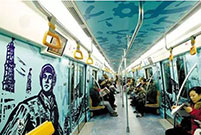

This year alone, the Italian Embassy has rejected close to 290 visa applications from Chinese students. That's nearly 10 percent of the total number of applications in China.
The high rate of visa rejection has become a big concern among many Chinese applicants.
Those rejected were applying for student visas through a partnership program between Italy and China, the Marco Polo and Turandot Projects, which focus on the arts, music and design.
In the past, the projects had a very high visa approval rate with simple requirements for applicants.
But Lyu Xun, who applied to a music school through the project, was rejected for not having sufficient and consistent financial support from his family.
"I have provided documentation, my parents' salary card, employment certificate letter, a one-year bank statement. They have saved 220-thousand yuan in the bank."
The Italian visa application center in Guangzhou and Shanghai have explained applicants only need to provide about 58-hundred euro as a deposit.
Many other students have received similar rejection reasons from the Italian Embassy even though their deposit money is much greater than the requirement.
Starting from this year, applicants for the Marco Polo and Turandot Projects are required to provide a six-month bank statement.
Gao Di'an, with the Italian Embassy in China, used one rejected case to illustrate why the bank statements were needed, to make sure applicants haven't pooled money temporarily in order to obtain a visa.
"Before the application there was 49.7 renminbi, he put away money just for the application. In December was the first application, then immediately they withdrew the money. Failure to prove that he has enough money, because he had just made the deposit the night before the application."
Gao says this year, around 12 percent of applicants have been found to have made such temporary deposits, which many Chinese think is common.
Apart from insufficient proof of financial support, Gao Di'an says a number of visa rejections are also due to the increasing number of fake documents being submitted such as fake bank account documents, bank statements and employment certificates.
Gao says once identified as providing fake documents, the applicant's honesty record will be affected for any kind of visa application in the future.
"When you submit a fake document, you are doing something illegal, you are lying to government. So, obviously, the expectation of getting a visa should be very very low."
Xiong Bingqi with the 21st Century Education Research Institute says honesty is urged not only for students, but also for overseas study agencies, which make a profit out of helping Chinese students get a visa.
"Applicants will be influenced if they are identified as using fake documents, but the overseas study agencies will not be punished. The fraud practice is an act of illegal operation and their business licenses should be revoked."
This is not the first time that a large number of Chinese students have received visa rejections.
Last year, the Australian authorities cancelled nearly 1,800 student visas from Chinese people on the grounds that they were not genuine students.
 Have you ever taken these beautiful subways in China?
Have you ever taken these beautiful subways in China? Chinese beauties, foreign models meet in Chengdu
Chinese beauties, foreign models meet in Chengdu Awesome! Aerial pictures taken on J-11 fighter
Awesome! Aerial pictures taken on J-11 fighter A foreign girl explains what China should be proud of
A foreign girl explains what China should be proud of Chinese navy's air-cushioned landing craft in pictures
Chinese navy's air-cushioned landing craft in pictures Chinese pole dancing master opens class in Tianjin
Chinese pole dancing master opens class in Tianjin Splendid Sichuan after snow
Splendid Sichuan after snow College girl of Vancouver crowned Miss Chinese Int'l 2016
College girl of Vancouver crowned Miss Chinese Int'l 2016 Pentagonal Mart becomes the largest vacant building in Shanghai
Pentagonal Mart becomes the largest vacant building in Shanghai Top 20 hottest women in the world in 2014
Top 20 hottest women in the world in 2014 Top 10 hardest languages to learn
Top 10 hardest languages to learn 10 Chinese female stars with most beautiful faces
10 Chinese female stars with most beautiful faces China’s Top 10 Unique Bridges, Highways and Roads
China’s Top 10 Unique Bridges, Highways and Roads Hijacking the airwaves
Hijacking the airwaves Ma’s island visit draws line for DPP
Ma’s island visit draws line for DPP Private schools attempt to keep Tibetan language alive
Private schools attempt to keep Tibetan language alive Poor reviews spark debate about Lang Lang’s musical standing
Poor reviews spark debate about Lang Lang’s musical standingDay|Week